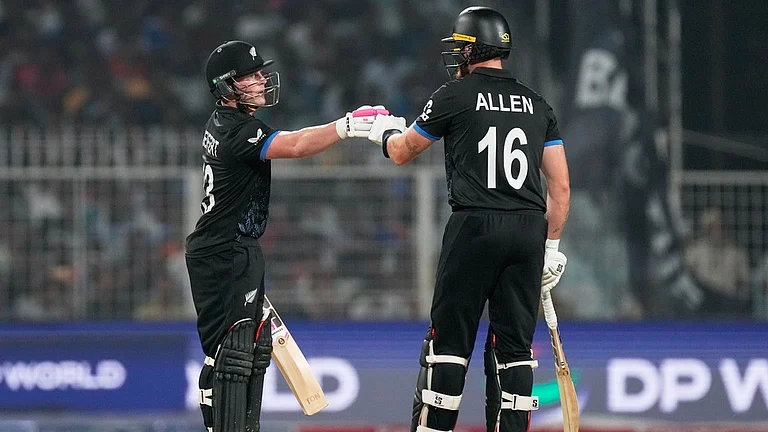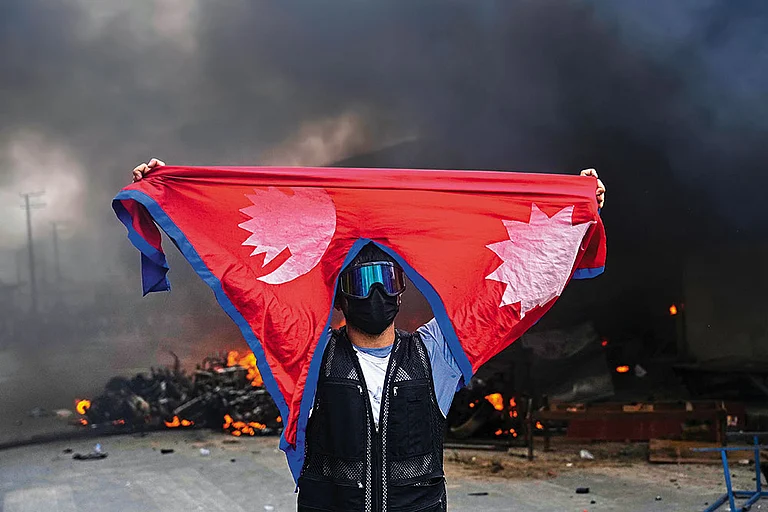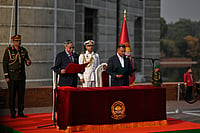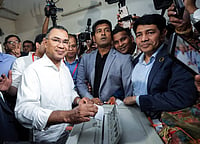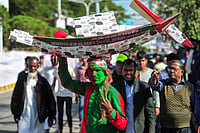About 12 years ago, the day Debshankar Santra turned four years, four months and four days old, his school, Saraswati Shishu Mandir at Sepoy Bazar area in Midnapore town of West Bengal, organised a hatey khowri or aksharavyasam—a Hindu ceremony marking a child’s formal entry to education—with a yajna at the school premises. His parents, Durgaprasad and Banashree were present. After the yajna, the priest initiated him to learn the alphabet, starting with OM.
Banashree and Durgaprasad were impressed and relieved. A school that makes such elaborate arrangements for a Hindu household ceremony like hatey khowri could be trusted with taking care of the child, they thought.
Now that Debshankar has been jointly ranked seventh in the state in the Madhyamik Pariksha—the secondary exam of the state board—Banashree is happy that their first impressions of the school were not wrong.
They had enrolled Debshankar in the school in the pre-primary section called Arun for children above three years of age. The school taught him basic skills like running, jumping and pouring water from a bottle. After the pre-primary Arun and Uday sections, he studied there till class IV. Then they enrolled him in class V at the Saraswati Vidya Mandir, the secondary section run by the same management in the Jamunabali area a few km away. Now, despite the fact that his results give him a chance to enrol in a more reputed school for class XI, Debshankar says he is going to continue here for his higher secondary education.
“Nowadays, you see a lot of ageing parents being ill-treated or abandoned by their children. Who wants to be ill-treated by their children?” asks Banashree, and continues, “This is a spiritual kind of school which works beyond covering the syllabus and actually gives moral education. They teach respect for parents and elders, good manners, devotion, patriotism, and traditions.”
She says that they are a religious family and are happy to see the child being influenced the right way, in the traditional Indian value systems that the society has started losing. “The school taught him about the ancient Indian civilisation, our sages, and the Puranas. In the past, children used to hear these things from their grandparents. Now, many do not live with grandparents and parents hardly have time to listen to all these stories,” says Banashree.
To inculcate greater interest in these topics, she also encouraged her son to watch the Ramayana, Mahabharata, and other Purana-based television productions at home.
The family was not aware of the school’s connection with the Sangh Parivar until recently, but they are not bothered because either the teachers clad in dhuti-panjabi (dhoti-kurta) or white sari with red borders is a reminder of the old times when, as she believes, teachers were more dedicated to serving society.
“In today’s times, when every profession is getting flooded with money-minded people, these schools still have service-oriented teachers, like the teachers of our times,” says Banashree. Teachers were in constant touch with parents and even paid an annual visit to every student’s home.
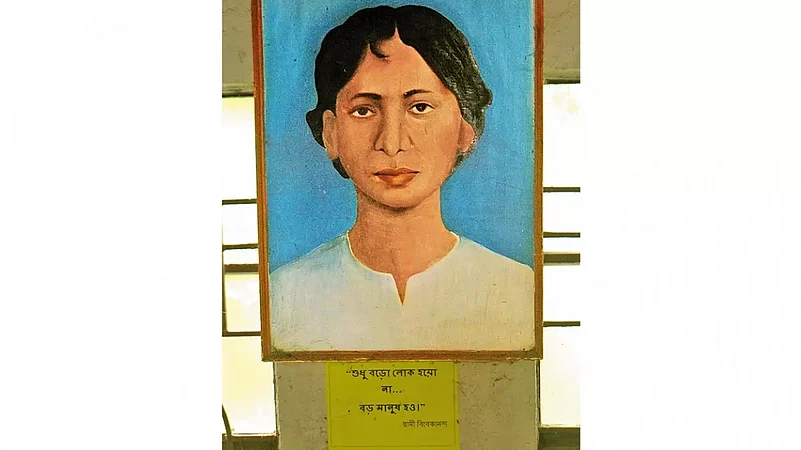
Asked how she would feel if Debshankar later gets a good job opportunity in a megacity or abroad, Banashree says she hopes, “god willing”, their son would not abandon them even if he has to go outside to earn more. “Things that you learn in your early years usually have a lasting impact,” she says.
Schools such as Saraswati Shishu Mandir, Sarada Shishu Mandir, Sarada Shishu Tirtha, and Saraswati Vidya Mandir are run by the Vidya Bharti Akhil Bhartiya Shiksha Sansthan, or simply, Vidya Bharati, the school education wing of the Rashtriya Swayamsevak Sangh (RSS), the ideological-organisational parent of the Bharatiya Janata Party (BJP). Nationally, they run 12,754 schools, where 1.5 lakh teachers take care of 32.92 lakh students.
In the words of its national president, D Ramakrishna Rao, it is a “national movement to summarily transform the present education system to make it more meaningful, purposeful and futuristic based on Bharateeya values, cultural, philosophical, psychological and sociological foundations”. The system focuses on the “all-round development of the child by following the latest trends so that they become a global player and competitor”.
Even though they talk of a futuristic system, the activities essentially focus on respect and pride in an incredible past the Hindus had, like no other people on earth. Looking back at the past glory of India was an essential part of the 19th-century Hindu revival and has remained one of the core areas of the Sangh Parivar’s focus to unite Hindus to restore that glory. These schools have played an instrumental part in this mission.
The schools mostly follow the syllabus of the board it is affiliated to. However, the extra-curricular activities that play a central role in such schools often please the parents no less. Prayer gatherings take place twice a day—first Saraswati Vandana and other religious songs before the start of the classes, and Vande Mataram at the end of the classes.
Often, Vijnana Bharati, the science wing of the RSS, conducts Vedic mathematics workshops. Cultural programmes include recitals in Sanskrit. Besides, all students must appear in the All-India Cultural Awareness Examination that Vidya Bharati Sanskriti Shiksha Sansthan conducts at the national level every year. For this, they must study the books of the Bodhmala series.
The class 10 book says Hindu children are indebted to gods and goddesses who gave us natural resources; sages who gave us knowledge; and, fathers who gave them their body, mind and intelligence. It teaches that the Hindu way of life stressed more duties than rights and that it was Lord Ram who revealed the ideal form of discharging duties. It says that to Shivaji, the Maratha king, the mother’s order meant dharma.
It describes Brahmacharya as studying while practising self-restraint, which includes waking up before sunrise, having a sattvik diet, practising yoga and meditation and devoting time to spiritual/religious prayers.
The teachings are not limited to merely respecting parents but extend to worshipping them. In 2020, the Sarada Shishu Vidya Mandir at Tantiberia in Howrah district of West Bengal organised a matri-pitri pujan ceremony, where children worshipped their parents by lighting up earthen lamps, garlanding parents and touching their feet. It was held on February 14, which is globally celebrated as Valentine’s Day. The school authorities argued that their event was aimed at directing the children’s love towards their parents and motherland, rather than events signifying degenerate and alien culture.
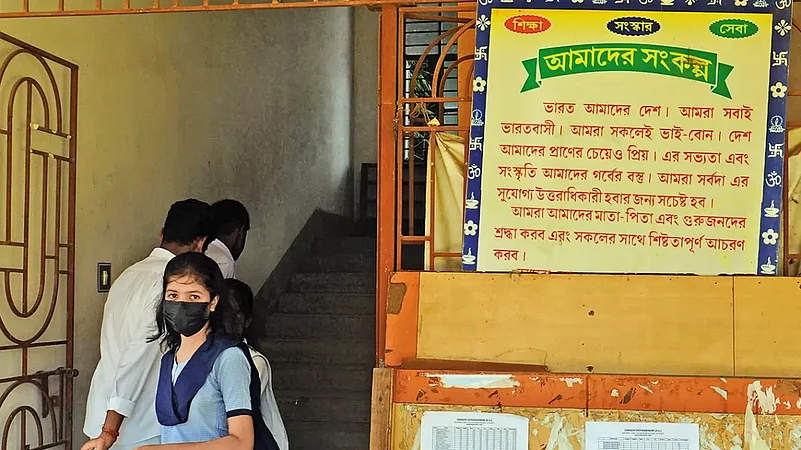
“It’s good to see how this school is trying to restore the traditional value systems of Indian society in which children remain devoted to their parents and siblings. The Western sense of nuclear families has disturbed the Indian societal system,” says one of the parents, an employee of the state government, who did not wish to be named fearing harassment at the workplace.
The Mamata Banerjee government had made its dislike clear for the Vidya Bharati-run schools, but could not influence its functioning. “When we were small, we barely dared to oppose our parents, we rarely talked back. But today, things have completely changed,” a parent rues.
According to political scientist Udayan Bandyopadhyay, who teaches at Bangabasi College in Kolkata, such moral teaching in schools does not play any significant role in shaping one’s mind and has no electoral impact. “The unaffiliated madrasas and Christian missionary schools, too, impart extra-curricular and moral teachings. They, too, teach many unscientific things and such orientation courses are mandatory for teachers. Students, in fact, often find these extra-curricular and moral lessons as a burden. One’s mind is shaped by his or her life’s events far more than what is taught in schools,” he says, adding that the conservatism and communal elements in the Vidya Bharati curriculum have “a general acceptance” in Hindu society, which is why parents do not bother about them.
These schools do not provide education for free, unlike government schools, but most parents told Outlook that they are happy to pay (a few hundred rupees per month, depending on the class) as long as their children are “in good hands”.
“Modern education often tends to provoke rationalist thoughts, questioning the very existence of god. But at some point in time, one will realise that science cannot answer every question and then we need to seek the recourse of spirituality. It’s good if religiousness is part of lifestyle right from the beginning,” says Tapas Kumar Adak, a government school teacher, whose son, Suprabha, ranked fifth in the state in the Madhyamik exam and is studying in the same school as Debshankar.
He wanted his son to study at the famed Ramakrishna Mission at Narendrapur on the outskirts of Kolkata—an institution known for discipline, lessons in values, and good academic results—but Suprabha does not want to stay away from home.
“We don’t merely prepare students for a competitive world, we also prepare them to fight the cultural degeneration in society,” says Debangshu Kumar Pati, one of the organisers of Vidya Bharati’s south Bengal chapter.
According to him, the core aim is to build generations of students who will have love and respect for the Indian Knowledge System, Puranas, sages, and traditions.
Besides, Bharat Mata Ki Jai, a slogan that in modern times has become closely associated with the BJP, is one that students get accustomed to here. Apart from its use at different events, in the book for class nine, a subheading titled Chant Bharat Mata Ki Jai describes how RSS founder K B Hedgewar, while travelling to Sonipath after the ban on the organisation was lifted, was greeted with slogans hailing him, to which he objected and asked everyone present to chant only Bharat Mata Ki Jai. Lotus tops the list of holy symbols.
The schools work in coordination with several other Sangh Parivar organisations. According to a Vidya Bharati functionary, who spoke on condition of anonymity, a number of programmes and lessons devised through research and analysis conducted by organisations like Rashtriya Shiksha and Bharatiya Itihas Sankalan Samiti are first implemented through the Vidya Bharati schools and the chain of Ekal Vidyalaya, the one-teacher coaching centres run by Friends of Tribal Society (FTS). Most Vidya Bharati schools cater to students till class four. However, according to several alumni, this leaves a lifelong impression.
“I am quite proud to say that whatever I have managed to achieve is because of my primary schooling at Sarada Shishu Tirtha,” says Shankhadeep Mahato, the secretary of Praktan Vidyarthi Sangha or alumni association of the school located in Siliguri town of northern Bengal. Now doing his doctoral research in rural development at the University of North Bengal, Mahato studied at Sarada Shishu Tirtha from pre-primary to class four, after which he shifted to a government school. His father is a teacher at another Vidya Bharati-run school a few km from their home. Despite spending the larger part of his educational days in government schools, Mahato considers himself indebted to the Sarada Shishu Tirtha.
“Teachers were so caring that at the end of school hours, they would even check if any student had ink-stained fingers. Then they will teach them how to use the pen properly,” Mahato says. Among the lasting impressions that the school has left on him is an understanding of the Indian value system, love for the motherland, recognising the priority of duty over rights, the glory of Indian civilisation and ancient Indian knowledge system, and the moral strength to make sacrifices for fellow country people.
“The school gave me confidence. When you have to raise the Bharat Mata Ki Jai slogan while standing in front of dozens of students, you gain confidence. The school actually taught us life skills and leadership ability,” says Mahato. He has never been involved with any political organisation but is engaged in social work, which includes providing digital literacy to underprivileged children and spreading awareness about the National Education Policy 2020.
(This appeared in the print as 'Schools of Thought')



